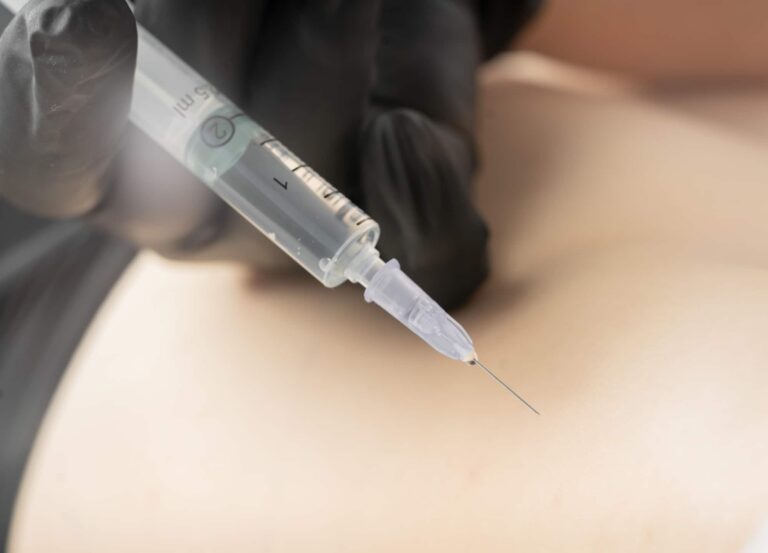It was supposed to be a routine fat transfer, with the goal of a little extra volume in the breasts. Impressed by the photos of his results, Tiffany*, a 26-year-old woman living in Florida, settled on a Miami-based plastic surgeon. Then things took a turn.
Tiffany was surprised when she called the clinic this past September and was immediately scheduled for surgery, without being offered an in-person consultation first. After waking up from anesthesia, she found herself recovering in a dental chair for a brief, 20-minute period before being ushered into a car. Shortly after, she fainted four times, which caused her stitches to open and sent her to the ER.
Tiffany spent six days in the hospital, receiving blood and iron transfusions. The clinic didn’t respond to her complaint for three days—and in that time, she discovered that other women had experienced similar trauma after being treated by the same surgeon. She decided to contact Orlando-based personal injury attorney Andres Beregovich.
Beregovich has represented many victims of medical malpractice as well as their relatives. In one instance, he was contacted by the families of two women who had died on the operating table during Brazilian butt lift procedures in Miami. Most frequently, he is approached by women who are disappointed with their aesthetic results, which he notes is often not grounds enough for a malpractice suit. Then, he says, there are women like Tiffany.
“Our allegations include that [Tiffany’s] surgeon violated the standards of care for office surgery by removing more than the allowable amount of supernatant fat during [her] liposuction procedure,” Beregovich explains. “Many patients who sustained negligent injury at the hands of their surgeon, like [Tiffany], never even know that their surgeon executed an illegal surgery.”
Medical malpractice can take on many forms, from removing more than the allowable amount of fat to performing surgery in a state where the doctor is not registered. “The basis for your medical malpractice lawsuit is whether your surgeon violated the standard of care for a plastic surgeon with the same knowledge, skill, and experience normally provided by other plastic surgeons,” says Beregovich.
“A patient cannot consent to an illegal medical procedure,” he explains. “If a patient cannot consent, then the act of performing surgery by the surgeon is by default civil battery.”
But first, before going the legal route…
It’s important to distinguish between a disappointing outcome (for example, not liking how high your implants sit) or a standard complication (such as capsular contracture) and negligence. Every surgical procedure carries uncertainty and risks, and patients should be made well aware of them prior to signing consent forms. Before looking into bringing a lawsuit, go to your surgeon with your concerns and discuss the pros and cons of revision surgery.
“[This is the beginning] of a further conversation as to how the complication should be managed,” says Dr. Urmen Desai, a board-certified plastic surgeon in Beverly Hills, California. “After a lengthy conversation with their original surgeon, patients should evaluate whether they feel comfortable undergoing a revision procedure with their original doctor or [prefer to look] for a board-certified plastic surgeon they feel comfortable with.”
Often it can take up to one year for complications to resolve on their own, notes Dr. Desai. He adds that while swelling, bruising, or general asymmetry may self-rectify as the body adjusts, a responsible doctor will still welcome post-op dialogue with a patient. If revision surgery is the best course of action, a patient may be on the hook for nonnegotiable costs even if the surgeon waives their own fee. These can range from anesthesia and operating room costs to implant or graft fees.
Every surgeon has their own policies on revision surgery,” Dr. Desai says. “A detailed conversation should be had before planning for revision surgery so as to minimize any surprise costs.”
If a revision surgery won’t correct a complication and you would like to pursue legal action, then…
1. Keep detailed documentation of your medical journey
Dr. Desai has seen a surge in malpractice claims following Brazilian butt lift surgeries and abdominoplasties. In the aftermath of these procedures, severely injured patients should immediately seek medical treatment from an alternative source in order to diagnose their postoperative medical condition, since sometimes infections can lead to injury, sepsis, or even death.
Beregovich also recommends documenting any critique from other doctors of your original provider’s work as well as your own post-op experiences, via photographs or journal entries.
“One of the most significant things you can do for your anticipated medical malpractice case is to create a medical diary, to share what is happening to you medically and your current emotional state. Juries often award damages for mental anguish and pain and suffering aside from past and future medical bills and lost wages.”
2. Then understand whether a lawyer will take your case, even if you think there’s negligence involved
Beregovich believes it is most crucial to find out whether or not your surgeon maintains medical malpractice insurance. “In Florida, for example, doctors elect to carry medical malpractice insurance, it is not mandatory. Lawyers are loath to take cases, especially medical malpractice cases, when there is no insurance policy to cover the loss,” he says, warning “buyer beware” if you choose a surgeon who does not carry medical malpractice insurance.
According to Beregovich, understanding what you’re up against is critical, since the statute of limitations on medical malpractice cases in most states is as little as one to three years—leaving you little time after your injury to file a lawsuit. If you don’t contact a lawyer immediately—especially because there’s always a significant pre-suit process, for which a medical expert must be retained—you may be barred from filing a claim at all.
An online resource for patients who believe they’ve been a victim of malpractice, Justpoint references 300,000 historical claims, to evaluate your case before recommending a suitable lawyer. Cofounder and CEO Victor Bornstein explains that there are three key facts patients need to know about the legal process of malpractice claims: the statute of limitations is extremely short, pain or damages make a case only if there is negligence involved, and lawyers should always work on contingency (they are paid their fees only if they win).
“Something patients often misunderstand is that even though damages may be high, attorneys will likely not retain a claim if the cause of death or injury is unclear or there’s no proof of deviation from standard of medical care,” Bornstein says. “While death, job loss, or reduced ability to work, income loss, and property loss all add up to economic damages, the loss must be an effect of the plastic surgeon’s negligence.”
3. Manage expectations about what you could win
Beregovich explains that seasoned malpractice defense lawyers often argue that the patient accepted the risks of plastic surgery—particularly if they signed an informed consent—but ultimately, signing a liability waiver may be of little consequence. Bornstein says some states even bar physicians from having their patients sign liability waivers (check with your state’s board of medicine). More common are arbitration agreements—which, if signed, mean your case will be settled by lawyers rather than in front of a judge. Regardless of a waiver, Bornstein says, a claimant can argue inadequate consent if they, or another surgeon, might have made a different decision prior to surgery.
“Success rates depend on the presence of damage, the extent of the damage, proof of causation by the plastic surgeon, the medical records provided by the patient, state of the patient, and participation of the patient in the malpractice,” he adds.
A safer future for cosmetic surgery patients
Six weeks after her surgery, Tiffany is still healing. She was forced to quit her studies, and she missed out on a job opportunity during her recovery because her blood pressure was so low that she was unable to drive. She has begun the process of suing her surgeon—and realizes the fight may be a bitter one. Still, Tiffany remains determined that what she went through should never happen to anyone else: “I told [Beregovich] that my surgeon does not deserve to be practicing on people.”
While Andres Beregovich stipulates that his primary goal is for clients to be compensated for negligent injuries, he is determined for his legal efforts to influence the cosmetic surgery industry at large—specifically, by driving safer procedures.
“We champion the rights of those with inconceivable injuries, against the toughest odds,” he explains. “We are hopeful that over time, our legal efforts, arguments, and wins will reflect positive changes, fewer injuries, and more transparency in plastic surgery.”
*Name has been changed to protect privacy.











